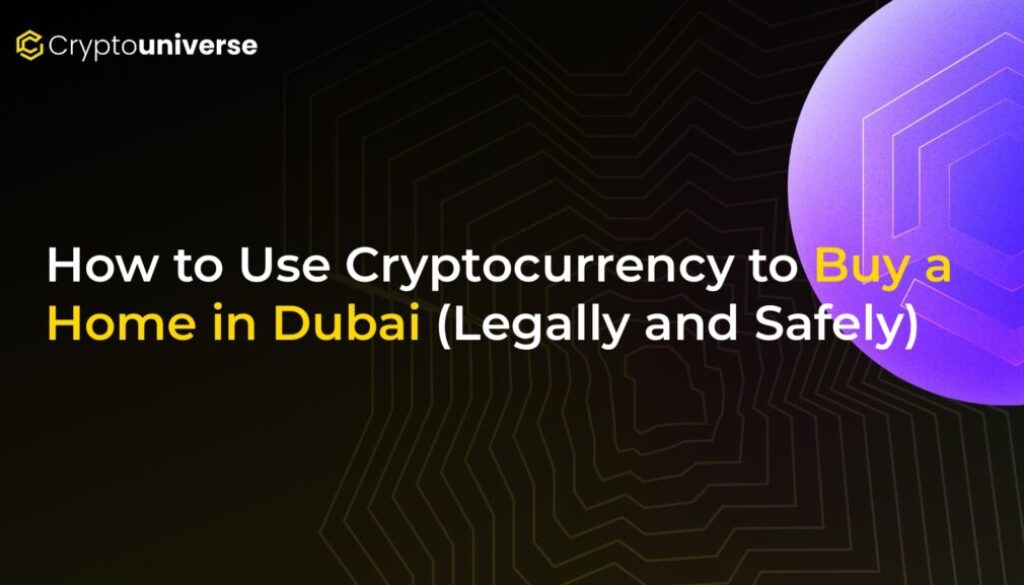How to Use Cryptocurrency to Buy a Home in Dubai (Legally and Safely)

Dubai’s Real Estate Market is Going Crypto. Here’s What You Need to Know.
Dubai has long been synonymous with futuristic skylines and ambitious innovation. Now, it’s adding another groundbreaking development to its portfolio: a fully regulated market for buying property with cryptocurrency. What once seemed like a far-fetched idea is now a practical reality, with major developers and clear government oversight making it easier and safer than ever to purchase your dream villa or apartment using digital assets.
For international investors and crypto enthusiasts, this opens up a world of opportunity. But how does it actually work? Is it legal? What are the risks involved? This guide breaks down everything you need to know to use cryptocurrency to buy a home in Dubai, covering the legal framework, the step-by-step process, and the exciting future of tokenized real estate.
The Legal Landscape: Is It Safe to Buy Property with Crypto in Dubai?
The short answer is a resounding yes—provided you follow the rules. Dubai has proactively built one of the world’s most comprehensive regulatory environments for digital assets, ensuring that property transactions are both secure and compliant. Three key bodies govern this process:
- Virtual Assets Regulatory Authority (VARA): Think of VARA as the primary crypto watchdog. Established in 2022, it oversees and licenses all virtual asset service providers, including exchanges, brokers, and custodians like Binance and Laser Digital. VARA’s framework ensures that any crypto transaction for property is handled by a vetted, legitimate entity.
- Central Bank of the UAE (CBUAE): The CBUAE governs the financial side, particularly the conversion of crypto to fiat currency. Its regulations mandate that any transaction involving AED-backed stablecoins must be processed through licensed entities, complete with full Know Your Customer (KYC) and Anti-Money Laundering (AML) checks.
- Dubai Land Department (DLD): The DLD is the ultimate authority for property registration. While you can pay the seller in crypto, the DLD requires that all official title deeds and contracts are finalized and recorded in UAE Dirhams (AED). This ensures the legal enforceability of the sale.
This layered system creates a clear and secure path: you can pay in crypto, but the funds must be converted to AED through a licensed channel before the property title is officially transferred. This balances innovation with the stability of traditional property law.
From Bitcoin to Buildings: Who Accepts Crypto?
Dubai’s real estate sector has warmly embraced crypto. Walk into many brokerages today, and you’ll find agents well-versed in digital currency transactions. Several of the city’s most prominent developers are leading the charge:
- Damac Properties: A pioneer in luxury real estate, Damac accepts Bitcoin (BTC) and Ether (ETH) for its high-end and off-plan projects.
- Emaar Properties: The developer behind the iconic Burj Khalifa, Emaar, also accepts digital asset payments on select developments.
- Nakheel: Known for Palm Jumeirah, Nakheel facilitates crypto payments for sales and rentals through licensed partners.
Beyond developers, a growing ecosystem of specialized brokerages and platforms like Crypto-Dubai.Properties and Provident Estate handle the entire process, from structuring the contract to managing the conversion, making it seamless for buyers.
A Step-by-Step Guide to Buying a Home in Dubai with Crypto
Ready to make a move? Here’s a simplified breakdown of the process to use cryptocurrency to buy a home in Dubai:
Step 1: Find a Crypto-Friendly Agent and Property
Partner with a real estate agency experienced in crypto transactions. They will help you find properties where sellers and developers are open to digital asset payments and can guide you through the specific requirements.
Step 2: Structure the Sales Agreement
Your Memorandum of Understanding (MOU) or sales agreement is critical. It must clearly state the purchase price in AED but specify that the payment will originate in a designated cryptocurrency (e.g., BTC, ETH, or USDT). It should also outline the process for conversion.
Step 3: Partner with a Licensed Conversion Provider
You cannot use just any platform to convert your crypto. You must use a VARA-licensed exchange (like Rain or Binance UAE) or a regulated crypto payment processor. Many firms offer crypto escrow services, which hold the funds securely until all conditions of the sale are met, protecting both buyer and seller.
Step 4: Complete KYC and Source of Funds Checks
Be prepared for thorough due diligence. Under UAE law, you will need to provide standard KYC documents (passport, proof of address) and, crucially, a clear source of funds for your crypto. This may include transaction histories from exchanges and on-chain wallet verification.
Step 5: Execute the Transaction
Once compliance checks are cleared, you will transfer your crypto to the licensed provider. They will convert it to AED at an agreed-upon rate and transfer the fiat funds to the seller’s account. Many processors offer locked-in exchange rates to protect you from price volatility during the transaction.
Step 6: Finalize the Title Deed with the DLD
With the payment confirmed in AED, your agent will finalize the transfer of the title deed at the Dubai Land Department. All official documents will reflect the property value in AED, making your ownership legally binding.
The Advantages of Using Crypto for Dubai Real Estate
Why go through this process instead of a traditional bank transfer? The benefits are significant, especially for international buyers.
- Unmatched Speed: Crypto transactions settle in minutes or hours, not the days or weeks required for international wire transfers to clear.
- Lower Costs: Traditional cross-border transfers can incur fees of 2-5%. Crypto transactions are often under 1%, saving you a substantial amount on a high-value property deal.
- Global Accessibility: Crypto bypasses complex correspondent banking systems and currency controls, giving investors from anywhere in the world direct access to the Dubai market.
- Enhanced Transparency: Every transaction is recorded on the blockchain, creating a permanent and auditable trail for regulators and all parties involved.
Navigating the Risks: A Buyer’s Checklist
While the process is regulated, inherent risks remain. Here’s how to manage them:
- Price Volatility: The value of BTC and ETH can fluctuate. Mitigation: Use stablecoins like USDT or USDC, which are pegged to the US dollar, or ensure your sales contract includes a clause to lock in the exchange rate.
- Regulatory Changes: Dubai’s crypto rules are still evolving. Mitigation: Work with a knowledgeable legal advisor or real estate agent who stays current on updates from VARA and the CBUAE.
- Counterparty Risk: The biggest danger is using an unlicensed broker or exchange. Mitigation: Only work with VARA-licensed entities. Verify their license on the official VARA public register.
- Compliance Hurdles: Unclear fund sources will raise red flags. Mitigation: Keep meticulous records of your crypto’s origin and be prepared to present a clean, verifiable transaction history.
The Future is Tokenized: What’s Next for Dubai’s Property Market?
Crypto payments are just the beginning. Dubai is rapidly moving towards a fully digital real estate ecosystem driven by tokenization.
Property tokenization involves converting physical real estate assets into digital tokens on a blockchain. This allows for fractional ownership, where investors can buy and sell shares of a property as easily as trading stock. Platforms like Prypco are already making this a reality, with one 1.75-million-AED property selling out its tokenized shares to over 160 investors in just five minutes.
As institutional players like Damac enter the space with billion-dollar tokenization projects, this trend is shifting from a niche concept to a mainstream investment strategy. The ongoing collaboration between the DLD and crypto platforms is laying the groundwork for a future where you can trade fractions of a Dubai villa instantly from anywhere in the world.
By establishing a clear, secure, and forward-thinking framework, Dubai isn’t just allowing crypto in real estate—it’s building the future of it.


